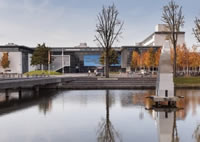
A presentation for Faculty of Industrial Design Engineering at TU Delft on 21 June 2021.
A video of the presentation and discussion is available HERE and the PowerPoint slides are available HERE.
A practical challenge is to find design theory that is universal and practicable across all design fields.
There are over 800 fields and sub-fields of design. Design theorists in each field have typically developed theories about design and models of design process that reflect the concepts and theories of the field.
For example, chemical process designers describe the design process as if it were a chemical process model, and Graphic designers (who often have an art background) describe design processes as if they are creative art projects.
A second fundamental weakness in Design Research and design theory making is the lack of foundational concepts and foundational research findings.
A third fundamental weakness is the 'gap' between 'design theories' and practice: the lack of direct connection between design theories and design guidelines.
A fourth challenge is the lack of coherence of design theories between each other.
A fifth challenge is the lack of inclusion in design theories of the reality that a large amount of design activity is undertaken automatically by computers and AI systems.
A sixth challenge is theorising about the essential centrality of prediction of the future as a core skill of designers.
Seventh challenge is developing the design theory that combines the sixth challenge with the problem that humans CANNOT understand and predict the behaviours of complex systems in mind and most design situations are complex systems. In other words, this indicates human designers are incompetent at designing such systems and all forms of stakeholder participative research and collaborative design are compromised or false when applied to complex situations (the situation they are most used for!).
The question then becomes which practical self-evident design concepts and theories can address the above challenges...?
Dr Terence Love Bio
Dr Terence Love has over 40 years' experience as a design researcher and as designer with a special practical design interest in solutions for the 25–30-year horizon. This includes being a hacker and programmer in the early 1970s devising design optimisation software and using the early Internet (JANET). Developing alternative technology and sustainability systems including a design for very low level (10m) aircraft-delivered tree seed. Being part of the design research team working on Torotrak gearbox in the late 1970s that around 2010 won a Formula 1 Engine Prize. Working on AI software for the French Gas Board and others in the early 1980s at Gwilym Jenkins Partners. Developing Robotic Training and micro-robotic engineering production cells in the late 1980s. Working on Hypertext networked Learning Management Systems in the mid-1980s.
Currently, Terence is involved with technical support for SRDS India who last year won the Energy Globe Award for water (a sort of Nobel Prize of Sustainability), and developing new systems theories and mathematics along with several sustainability and climate change projects including trying to discourage people planting trees in arid urban cities.